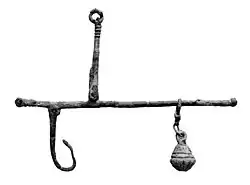безмѣнъ
Old East Slavic

безмѣнъ
Etymology
Unknown, attested from the late 14th century, which is after the Mongol invasion, so probably folk-etymologically altered after без- (bez-) + мѣна (měna) and a Turkic rendering of Arabic وَزْنَة (wazna), as most Slavic languages also have Arabic قِنْطَار (qinṭār) via Turkic to denote the steelyard, both originally units of weight.
Pronunciation
Descendants
- Russian: безме́н (bezmén)
- → Georgian: ბაზმანდი (bazmandi)
- → Armenian: բեզմեն (bezmen)
- Ukrainian: бе́змін (bézmin), бе́змен (bézmen), бедзвін (bedzvin), бедзмін (bedzmin), безмір (bezmir), безьман (bezʹman), безьмін (bezʹmin), безьмин (bezʹmyn)
- → Middle Low German: besemer, bisemer, bismer, bysmer, besmere
- Low German: Besmer, Bismer, Besemer
- → Middle High German: besemer, bisemer (rare)
- → German: Besemer, Besmer
- → Old Norse: bismari
- → Latvian: bezmēns, vezmēns
- → Lithuanian: bezmė̃nas
- →? Polish: bezmian, przezmian, przemian, przeźmion
- → Czech: přezmen
References
- Bismere in Johan Ernst Rietz, Svenskt dialektlexikon (1862–1867)
- Vasmer, Max (1964–1973) “безме́н”, in Oleg Trubachyov, transl., Этимологический словарь русского языка [Etymological Dictionary of the Russian Language] (in Russian), Moscow: Progress
Russian
Noun
безмѣ́нъ • (bezmě́n) m inan (genitive безмѣ́на, nominative plural безмѣ́ны, genitive plural безмѣ́новъ)
- Pre-1918 spelling of безме́н (bezmén, “stilyard”).
Declension
This article is issued from Wiktionary. The text is licensed under Creative Commons - Attribution - Sharealike. Additional terms may apply for the media files.